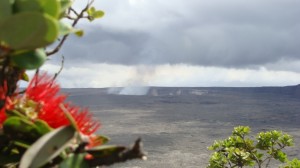Soil Transport Precautions Taken Against Rapid ‘Ōhi‘a Death

‘Ōhi‘a tree in the foreground with the Kilauea Volcano as a backdrop, file photo by Wendy Osher.
The Hawaiʻi Board of Agriculture today approved permit conditions for the movement of all soil from Hawaiʻi Island. The conditions were added to the current interisland quarantine to prevent the spread of Rapid ‘Ōhi‘a Death, unique strains of the fungus, Ceratocystis fimbriata.
State officials say the restriction on soil may affect those traveling to the Merrie Monarch Festival and purchasing potted plants on Hawaiʻi Island.
During this Merrie Monarch Festival period, HDOA Plant Quarantine inspectors have printed a travel alert that is available at airports statewide. The card explains the quarantine and what travelers should and should not do.
The Merrie Monarch Festival runs from March 27 to April 2 and the multi-agency ROD working group will have a booth at the festival for the collection of ‘Ōhi‘a material.
According to the advisory, potted plants that are in soil-free potting media may be transported interisland; however, if the potted plant contains soil from Hawai‘i Island, transport will be prohibited except by permit. Agricultural inspection is also required of all potted plants, cuttings and shoots for replanting.
Today, the board voted to approve the permit conditions for soil from Hawaiʻi Island, which include:
- Obtaining an interisland permit from the Hawaii Department of Agriculture;
- Soil is subject to testing for ROD or the shipper must be an active participant in HDOA’s Plant Quarantine Branch compliance program, which involves periodic testing and inspections;
- All shipments must be accompanied by a certificate of inspection from HDOA, an interisland permit and an invoice or packing list; Shipments must be clearly labeled as “Soil from Hawaiʻi Island” or “Soil Samples from Hawaiʻi Island for Research and Analysis,” and “This Parcel May Be Opened and Delayed for Agricultural Inspection;” and
- Shipments are subject to post-arrival inspection by a PQB inspector.
“The board took under serious consideration the impact of restrictions on the movement of soil from Hawaii Island and the majority felt that this action needs to be taken to help prevent the spread of this disease to uninfected islands,” said Scott Enright, chairperson of the Hawaiʻi Board of Agriculture in a state press release today. “Our team at Plant Quarantine will work closely with those who use soil in potted plants to help mitigate any adverse impact on the nursery industry.”
The Hawaiʻi Board of Agriculture issued an emergency quarantine in August of 2015 to stop the spread of the plant fungus from Hawaiʻi Island to other islands. The quarantine prohibits the interisland transport of ‘Ōhi‘a plants and plant parts, including flowers, leaves, seeds, stems, twigs, cuttings, untreated wood, logs, mulch greenwaste and frass (sawdust from boring beetles) and any soil from Hawai‘i Island without a permit issued by HDOA.
At the August 2015 meeting, the board requested more information and research into the ability of soil to be a vector of ROD so that they could determine if soil is more than just a carrier of ROD, and if soil containing ROD spores can infect ohia plants. Information provided at today’s meeting supported a continued quarantine on soil to stop the spread of ROD.
HDOA worked with researchers at federal and state levels, including the latest research being conducted at the U.S. Department of Agriculture’s Daniel K. Inouye Agricultural Research Service on Hawai‘i Island which indicates that ROD spores in soil may infect ‘Ōhi‘a plants. Earlier this month, the information was presented to the Advisory Subcommittee on Plants, the Advisory Subcommittee on Fungi and the Advisory Committee on Plants and Animals – all of which recommended the board approve the permit conditions for the interisland movement of soil from Hawai‘i Island.
Any person who violates the quarantine rule may be charged with a misdemeanor and fined not less than $100. The maximum fine is $10,000. For a second offense committed within five years of a prior conviction under this rule, the person or organization shall be fined not less than $500 and not more than $25,000.
ROD, also known as ‘Ōhi‘a wilt, was first noticed in 2010 in Puna. In 2014, the fungus was identified as Ceratocystis fimbriata by researchers at USDA-ARS. In 2014, it was estimated that the disease covered approximately 6,000 acres from Kalapana to Hilo and exhibited tree mortality rates of more than 50 percent. Currently, it is estimated to infect about 34,000 acres. So far, the disease has not been found on other islands. It is not known how the disease entered the state or where it came from.
Travelers seeking more inspection information may contact HDOA’s Plant Quarantine offices:
Hilo – (808) 974-4141
Kona – (808) 326-1077
Honolulu – (808) 837-8413
Maui – (808) 872-3848
Kauai – (808) 241-7135
More information on ROD may be found at the following links: HDOA website; or UH-College of Tropical Agriculture & Human Resources website










